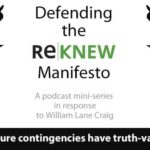We run our website the way we wished the whole internet worked: we provide high quality original content with no ads. We are funded solely by your direct support. Please consider supporting this project.
What is the significance of Jeremiah 19:5?
The Lord says that Israel has “gone on building the high places of Baal to burn their children in the fire as burnt offerings to Baal, which I did not command or decree, nor did it enter my mind.”
Here, as elsewhere, (7:31, 32:35), the Lord expresses disappointment, if not shock, over Israel’s idolatry. The most straightforward reading of the text suggests the Lord is admitting that it never occurred to him his people would actually behave in this deplorable manner. However we understand the phrase “nor did it enter my mind,” it would at the very least seem to preclude the possibility that the Israelites’ idolatrous behavior was eternally known in God’s mind. If God was eternally certain that the Israelites would do exactly what they did, as the classical understanding of foreknowledge requires, it is difficult to see how God could be speaking truthfully when he says it did not enter his mind that they would do this.
If we accept that the future is partly open, however, we can understand the Lord to be honestly expressing his dismay at the Israelites behavior. Of course the Lord would have known about the remote possibility of this behavior, for he knows all of reality, and whatever comes to pass was eternally possible to come to pass. But the remoteness of the possibility grounds the authenticity of the Lord’s declaration: he never thought they’d actually sink this low! And so far as I can see, such a declaration is utterly unintelligible if God was eternally certain the Israelites would sink precisely as low as they did and behave exactly as they did.
Category: Q&A
Tags: Open Theism, Q&A
Topics: Open Theism
Verse: Jeremiah 19
Related Reading

Podcast: If Open Theism is True, Does it Make Sense to Pray For Intercession?
Greg talks about prayer and freedom. Specifically, if free will is so important, why would God override it in answer to prayer? http://traffic.libsyn.com/askgregboyd/Episode_0123.mp3

What is the significance of Judges 10:13–16?
The Israelites cry out to God because of their oppression from foreign rulers. The Lord refuses to deliver them because they have abandoned him (vs. 13–14). The Israelites repented, put away their foreign gods and worshipped the Lord. The Lord “also could no longer bear to see Israel suffer” (vs. 16). Hence the Lord changed…

If God is already doing the most he can do, how does prayer increase his influence?
Question: If God always does the most that he can in every tragic situation, as you claim in Satan and the Problem of Evil, how can you believe that prayer increases his influence, as you also claim? It seems if you grant that prayer increases God’s influence, you have to deny God was previously doing…

Revelation 17:8 refers to people whose names haven’t been written in “the book of life from the creation of the world.” Doesn’t this conflict with open theism?
As in Revelation 13:8, the clause “from the foundation” (apo kataboleis) need not mean “from before the foundation” but simply “from the foundation” (= since the foundation). It’s not that names either were or were not written in the “book of life” before they were ever born. Rather, throughout history, in response to the choices…

What is the significance of Jeremiah 3:19–20?
“I thought how I would set you among my children…And I thought you would call me, My Father, and would not turn from following me. Instead, as a faithless wife…you have been faithless to me…” If the future is eternally and exhaustively settled, and if God therefore knows it as such, he could not have…

Podcast: Defending the Manifesto (6 of 10)
Greg responds to challenges by William Lane Craig from Craig’s podcast “Reasonable Faith.“ Greg denies Molinism and discusses the logic of possibility. http://traffic.libsyn.com/askgregboyd/Episode_0061.mp3
